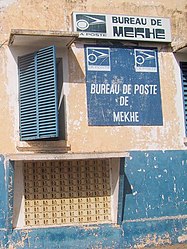Méckhé
| Méckhé | ||
|---|---|---|
|
|
||
| Coordinates | 15 ° 6 '44 " N , 16 ° 37' 55" W | |
| Basic data | ||
| Country | Senegal | |
| Thiès | ||
| Department | Tivaouane | |
| ISO 3166-2 | SN-TH | |
| height | 43 m | |
| surface | 5.5 km² | |
| Residents | 22,944 (2013) | |
| density | 4,171.6 Ew. / km² | |
| Website | ngayemekhe.com (French) | |
|
Post office with mailboxes
|
||
Méckhé or Mékhé , both spellings are officially used, is a town in the Tivaouane department in the Thiès region , in the central west of Senegal .
Geographical location
Méckhé is located around 100 kilometers northeast of Dakar and 26 kilometers northeast of the regional prefecture of Tivaouane on the edge of the rain-poor Sahel zone . The Grande-Côte and the coastal dune area is 29 kilometers away in the northwest.
history
Until the 18th century, the area of Méckhé was nothing but a huge forest in which wild animals, especially deer (ngaay), lived. The first settlers who settled here derived the original name of their settlement, which is still traditionally used today.
Méckhé, a train station since 1885, received the legal status of a town in 1911 (Commune de plein exercice).
population
The last censuses showed the following population figures for the city:
| year | Residents |
|---|---|
| 1976 | 8,663 |
| 1988 | 12,109 |
| 2002 | 15,291 |
| 2013 | 22,944 |
traffic
Méckhé is on the N 2 national road . In the southwest, starting from Diamniadio , the gateway to the major cities of the Dakar metropolitan region , following the Grande-Côte at some distance, it connects Méckhé with Sébikotane , Pout , Thiès and Tivaouane and then continues to Kébémer , Louga and Saint-Louis . From there it follows the left bank of Senegal in a large arc and reaches Richard Toll , Dagana , Ourossogui and finally Kidira on the Malian border.
The Dakar – Saint-Louis railway line, opened in 1885 and now closed, runs parallel to the N2 through the city.
In Méckhé a regional road branches off from the N2 in a south-easterly direction and leads via Baba Garage to Bambey .
economy
Mekhé is the West African center of handicraft. The city has 250 shoe, wicker and traditional spinning factories that directly or indirectly feed more than 4,000 families.
Town twinning
-
 Saint-Dié-des-Vosges , France
Saint-Dié-des-Vosges , France

